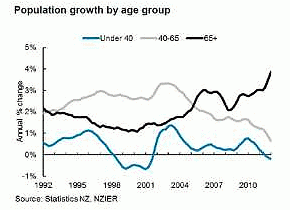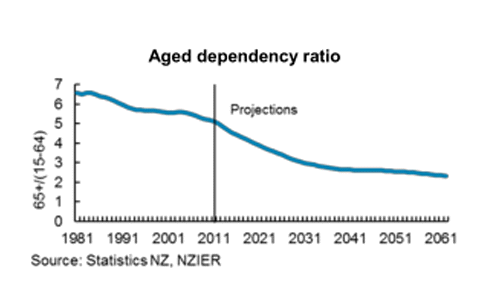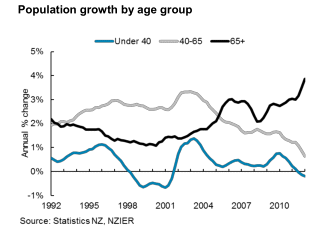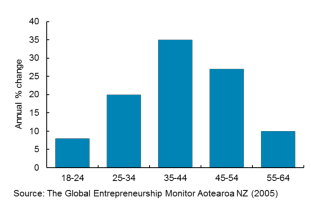
By John Ballingall and Shamubeel Eaqub*
The ageing population is not just a long term fiscal challenge. New Zealand, like many developed countries, has a rapidly ageing population. Over the past year the over 65 population has grown by 4% while the under 40 population has shrunk slightly.
Currently there are 5 working age people for every person over 65 and in 20 years‟ time figure 1 shows there will be just 3 working age people per person over 65.
We have raised concerns about the lack of political willingness to address the potential fiscal effects of this demographic shift. This shift will put pressure on superannuation and healthcare costs in particular.1
The economic impact of New Zealand‟s ageing population is a key theme of NZIER‟s Public Good work programme in 2012/13. We will release more work on these themes in coming months.2
… the impacts will be felt by all businesses
But New Zealand firms also need to be aware of the potentially significant implications of the ageing population on their business strategies. Some key impacts relate to:
- the make-up of the workforce
- succession planning
- entrepreneurship and innovation
- shifts in consumer demand.
Figure 1. Aged Dependency Ratio
More competition for junior and mid-level workers
As the chart below shows, the pool of available staff in the under 40 age bracket is already shrinking. This trend will continue.
Figure 2. Population growth by age group
Firms will need to work increasingly hard to attract and retain the best and brightest employees aged under 40 – they will become a scarce and prized resource. This has implications for the salary and development opportunities that firms will have to offer.
Don’t bulk buy the gold clocks just yet
Firms will need to do more to encourage older workers to stay in employment rather than spending more time with their grandkids or sharpening their golf handicap.
This might entail offering more flexible hours for those not wanting to work full time or drawing on these workers‟ institutional knowledge by retaining them as advisors to help bring through the next level of management.
Businesses might also want to examine how they attract and retain female, Māori and Pacific Island workers. The female labour force participation rate3 currently stands at around 63%, compared to 75% for males.4
While there are unsurprising reasons for this difference – namely bearing and raising children – closing even half the gap between male and female participation would increase the labour force by 4.5% today.
Firms may also want to consider the ethnic mix of their workforce. The Māori and Pasifika populations are significantly younger than the New Zealand European population. As Jackson (2011)5 notes, in 2006 the median age of the Māori population was just 23 years, compared with 38 years for the European/New Zealander/Other population.
This suggests that as many baby boomers are heading into retirement, there will be more employment opportunities for the younger Māori population. This shift may have implications for firms in terms of funding for development, given the lower average educational achievement of Māori and Pasifika.
Evidence shows that those in the 35-54 age bracket are responsible for the bulk of entrepreneurship activity in New Zealand. Workers approaching retirement have less incentive to introduce innovative work practices as the pay-off period to them is shorter. This suggests that the „stock‟ of innovation will decrease over time unless firms come up with creative ways to incentivise junior or older workers to invest in improving business practices or developing new products.6
Figure 3. Early stage entrepreneurs by age
The marketplace will change
The shifting demographic sands will also have some important impacts on the types of goods and services that households will demand in the future. Aside from the obvious increase in demand for aged care services and products aimed at the older age bracket, there will be some more subtle changes. A good example of this is in the demand for cars. It might be expected that the demand for cars will reduce as the population gets older. This is not necessarily so. We have analysed car ownership at the household level and found a significant effect on car ownership from older couples buying a second car. Couples in their fifties (or older) without children are more likely than most to be a two car family, primarily because at this age they are likely to be enjoying the highest disposable income of their lives.
En route to getting older, the New Zealand population will feature an increasing number of couples in their fifties and consequently an increasing number of people looking for a second car. This boon to the car market is set to grow for the next decade or so. After that it will ease off for a while but a further boost is in the pipeline. The baby blip that occurred in the 1990s was significant enough that by 2040 these newly minted 50 year olds will account for a significant share of the population and ready to buy second cars galore. The impact of demographic change on housing demand (and for the durables that are bought to fill houses) may also be significant.
Traditionally, those aged 20-44 years old have been seen as „prime-age house buyers‟.7 But if this cohort is shrinking in size, where will the demand for the houses that baby boomers might want to sell to fund their retirement come from?
Long term business planning requires in-depth understanding of demographics
Most New Zealand firms are currently focused on riding out the post-GFC economic adjustment. The business environment will remain challenging in the short term.8 But as the outlook improves, firms will start to think longer term. The most successful firms will be those that have a clear understanding of the impacts of demographic change on both the supply side and demand side of their businesses, and that put in place strategies to address the challenges and opportunities that an ageing population will bring about.
-------------------------------------------
This Insight was written by John Ballingall, Deputy CE, and Shamubeel Eaqub, Principal Economist, at NZIER.
References
1. See http://nzier.org.nz/publications/superannuation-dilemma and http://nzier.org.nz/publications/policies-madeon-a-calm-day-seem-more-r…
2. See http://nzier.org.nz/public-good for an overview of our Public Good work programme for 2012/13.
3. The proportion of the female working age population that is either employed or actively seeking employment.
4. Further information on female participation trends in New Zealand can be found at:
http://www.mwa.govt.nz/news-and-pubs/publications/work-and-enterprise and
http://www.treasury.govt.nz/publications/research-policy/wp/2005/05-06
5. See Jackson, N. (2011). „Mäori: Ko te Whakatipu Tängata hei Huanga Ohanga Mäori: Demographic Dividend for Economic Return‟. Research report to TPK http://www.tpk.govt.nz/en/in-print/ourpublications/
publications/maori-demographics-for-economicreturn/download/Maori%20Demographic%20Trends%20for%20Economic%20Return.pdf
6. Some evidence for the United States suggests older demographic groups have found creative ways of innovating, see for example “Why Baby Boomers are the Innovators of the future”, Dominic Basulto, Washington
Post, 26 June 2012.
7. Magnus, G. (2009). The age of aging: how demographics are changing the global economy and our world.
8. See NZIER‟s June 2012 Quarterly Predictions for our latest assessment.
19 Comments
Slower road trips getting held up behind more and more campervans and slower moving queues at supermarket checkouts?
There's a good article in the Herald today by Fran O'Sullivan on the ageing issue. She is quite critical of Key on this issue, which is a change as I think I called her Key's cheerleader on this site a couple of months ago.
Fran O'sullivan is a little confused. Not even sure what she proposes. Rasing age of national super to 67 ? Just makes a few intergenerational kickers feel a bit better. Won't change the picture more than a percent or two.
What we do need is a comprehensive investment system for all ages. Yes. That will mean there will be less disposable income in our pockets. But todays 30 year old cannot escape the likelyhood that they will only be earning income for about 50% of their life expectancy. They have to save save save. Now.
Expecting that the retirement income will magic up from somewhere will only lead to more of the intergenerational nastyness that Fran O'sulivan indulges in.
Lets embrace a stable population as a good thing. And that implies a permanent higher proportion of older people than now.
I detest the intergenerational warfare views. But it's clear each of us, should support ourselves (children excepted). From age 20 you will have about 40 -50 years of productivity and income and up to 40 years retirement where you will still want to eat.
It's inescapable that each of us while working has to invest a reasonable chunk of income to cover that gap. It does mean less disposable spending. Tough that - but better than relying on an increasing population of children and immigrants to support you.
Some say "oh but the boomers will hand big inheritances down".
That is overstated. Many boomers will have limited inheritances to hand down once they've spent it all, or once an inheritance is divided amongst 2 or 3 offspring.
I know 2 or 3 boomers who call themselves "SKIs" - "Spend Kids Inheritance" - they are going hell bent on enjoying their life and spending up all their money
A multi pronged approach is required, but getting affordable housing (how long do we need to wait Mr Key?) will mean people can save more
Matt (no longer in Auck) ...I'd have expected more from you than a pithy hear-say post.
A....you don't know who's got what to give to whom.....
B....you know two or three boomers......well how many is it two or three..? not a big number to recall the actuals of.
C... SKI's.....how cute is that...a lot of people I know say that, and do the exact opposite, and that, I can assure you is more than two or three.
D...Confiscation is that what you want...? I thought you extolled the virtues of freedom and Liberty.....now you want to confiscate in disguise...?
Here's what you do....get a mask n gun and persuade those bastard parents to fork it over before they have any chance of squandering away any more of your rightful inheritance.
I recall you once here agreeing the Entitlement mentality needed to be addressed, I didn't realize you meant enshrining it in law.
For what it's worth, (A factual story)had freind (passed) from Remuera, wife shortly after...two kids(people age) inherited 4.5Mill
One has done well and lives a comfortable but fairly normal life.
The other blew the first Mill on P and parties within one year, by the time a judgement was odered to declare him unfit to control his affairs a further 750k gone who knows where..?
it don't always work out the way you'd like it to.....but on the positive side your dead n can't do a whole lot about it.
Christov
I think you've inferred what I said incorrectly, and your comments are unfair.
I didn't advocate for confiscation at all, I simply stated (correctly) that many children of boomers won't get much inheritance - whether that's because the boomers want to spend their savings as they rightfully can ('Ski's'), whether the boomers have limited wealth, and / or multiple children receiving any inheritance minimises the quantum of the inheritance. I have seen many comments from boomers in other forums who often bring up the inheritance argument as a case against claims of intergenerational inequity - in my opinion, as outlined above, this inheritance based intergenerational wealth transfer effect will, on average, be limited.
You refer to some very rare examples of millionaires providing large inheritances. That is very much the exception rather than the rule.
If you read my posting carefully, you will actually see that I don't advocate for "confiscation" as a soluton at all, I advocate for policy that facilitates more affordable housing that:
1. Allows more young people to own housing
2. Allows them to save more so there is less future pressure on superannuation
I take your point here Matt...but this reads a whole lot better than your first post if you don't mind me saying.
Matt the reason there won't be that much to go around I cover in the thread (now killed) on the weekend, it is because at least half if not the greater majority of boomers will arrive at that point totally unprepared financially for their own retirement let alone address the inequalities caused by repeated governmental oversights in planning.
The example I gave you was not intended to represent some kind of norm....it was intended to show you that with the BEST of intention things don't always go the way we'd like...I'd bet his Dad would have wished it for a couple of deserving young couples as opposed to what happened sadly.
FYI.....I was talking to a senior Barfoot Manager (friend) on Saturday night...I asked the question on the firestorm housing boom in Auckland..
They responded clearly, succinctly,........by far the vast majority being over 80% is new money.
Make of that what you will, but while Bernards castigating Boomers, he may want to show a little balance and go after the Political Collective who have fertilised and fuelled the very dilema young hard working N.Z.'s find themselves in.
any that are still here of course.
Cheers Matt no offence intended BTW>)
a. I am very intrigued to know what what is meant by 'new money'. It sounds important but I am not sure just what is meant.
b. the intergenerational bashing going on seems to assume the oldies are rolling in wealth. I don't see it. Mostly they are of limited means and some of the soon to be oldies, looking a little affluent now, are about to hit the wall financially.
K.H. they were very specific about the origins of the persons driving the pricing and securing the properties.
Well, well, well, there you go. How many times have I suggested that Bernard pick up the phone and ask B&T. The info is there. They have it. They know. It simply requires a little bit of initiative.
Yeah. but who is that. Are we talking first home buyers, chinese, investors, or new lotto winners. Interested.
Did everyone read the full article? OK! those coming in the front door to replace those going out the back. Businesses require younger staff to have the correct skills and quals so I don't think we have a shortage of under 40s they just don't all have what businesses want which is evident by the number of imports we need to bring to NZ to fill the jobs. I'm sure those retiring don't all want go at 65 either and have alot to contribute in either payed employment or volunteer efforts.
As for the age bashing nonsense allow me this rant, because we now have Kiwi saver that is going to save us all. a salient point I make is I have paid high taxes for many years especially throughout the Clark government and was told that a portion of our high taxes goes to funding your super when your 65 so without a doubt I will be lining up for whats mine.
" I have paid high taxes for many years especially throughout the Clark government and was told that a portion of our high taxes goes to funding your super when your 65 so without a doubt I will be lining up for whats mine."
This is a common argument from those nearing retirement. I'm not sure any politician past or present has explicitly said your taxes would pay for your retirement - if they did then they lied (Shock, Horror). Your taxes went to pay for your parents retirement (Cullen fund excepted). That is the issue and always has been. Those nearing retirement and those far away from retirement need to understand there is no separate account of fund with a stash of cash been put away to fund their super.
You may be lining up for what you think is yours but with 3 workers for every 1 superannuiant by 2030 it will be a long queue for a small cheque.
Absolutely! a total delusion to believe any government will provide a happy retirement income however as most of you will all reach this milestione in your lives I'm sure you will be lining up for whatever is on offer, I don't believe for a second that one generation can complain about how much better the last generation had it, they were different times with different challenges we now have the lowest interest rates on home mortgages since the ark and the most favourable income tax system despite increased GST. NZ is now an easier place to do business and create wealth.
i wrk within a team of 40 people.
of those 15 are over 65 years old and do nothing but bitch and moan .
All of them seem to be saving for retirement which they should have done years ago.
An old chinese tale.Westerners are always preparing to die.
Recommend a Colon cleanse to them ngakonui gold....you'll find them less irritable with more energy......they won't get any better looking however...
Not the first time you've put that up either......go on ay..?
As per the NZ Herald article, can I congratulate Bernard on his election as Prime Minister.
Well done that man.
The FUTURES not ours 2c....but maybe a job for one of the boys in that inter-generational game, we call life..



We welcome your comments below. If you are not already registered, please register to comment
Remember we welcome robust, respectful and insightful debate. We don't welcome abusive or defamatory comments and will de-register those repeatedly making such comments. Our current comment policy is here.